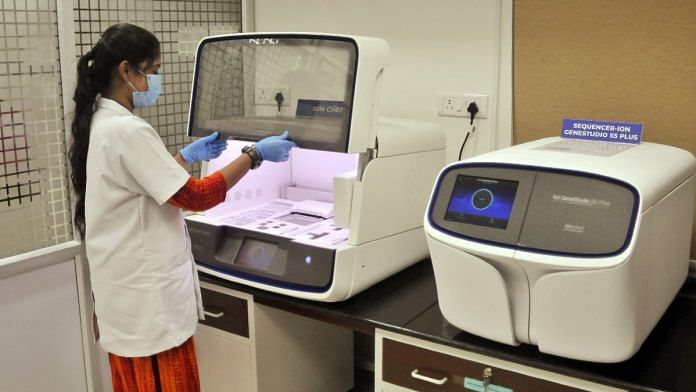New Delhi: Nearly half of all Covid-19 samples sequenced in India since January this year have been identified as caused by the Omicron variant of the SARS-CoV-2 virus, according to the latest bulletin of INSACOG, a nationwide network of genome sequencing labs monitoring the circulation of SARS-CoV-2 variants in the country.
The bulletin also revealed that India has very few recombinant variants.
INSACOG had not been publishing its weekly coronavirus bulletin since January, but uploaded a bulletin dated 11 April 2022 to its website Tuesday, revealing that a total of 2,40,570 samples had been sequenced across the country till that date. This number was 1,50,710 in the January bulletin.
Of the 89,860 samples sequenced in the intervening period, 45 per cent of the samples (44,100) were classified as Omicron, while the number for Delta in the same period was 2,705. Omicron had been identified in only 3,007 samples in the January bulletin.
Overall, the Delta variant has been identified in 43,538 samples since it surfaced in 2021, while 5,607 samples have contained the Delta Plus variant, 4,266 have had Alpha, 220 have had Beta and just three had the Gamma variant.
Also Read: As Omicron variant XE surfaces in India, here’s what you need to know about the Covid strain
‘Few recombinant variants found’
“Based on genome sequencing analysis, very few recombinant variants have been discovered in India. So far, none showed either increased transmission (locally or otherwise) or associated with severe disease or hospitalisation,” the INSACOG bulletin said.
Recombinants can occur when two variants of a virus infect the same host cell.
In the case of the novel coronavirus, exchange of genetic material between variants occurs primarily due to the manner in which RNA viruses copy genomes. During replication, the enzyme that viruses use for replication can end up stitching together bits from different variants.
The INSACOG bulletin noted that two recombinant variants — XD and XE — are being monitored closely across the globe.
XD, which has a mutation from the spike protein of the Omicron variant incorporated into a Delta genome, has been found primarily in France.
XE, meanwhile, is a recombinant of two sub lineages of Omicron — BA.1 and BA.2 — with a majority of the genome including spike protein genes identified in BA.2.
“Incidences of suspected recombinants and the possible public health relevance are being closely monitored,” the INSACOG bulletin added.
Last week, official sources had told news agency PTI that a brief resurgence of Covid-19 cases in Delhi was likely linked to a new variant, BA.2.12.1 — a sub lineage of Omicron.
However, the latest INSACOG bulletin makes no mention of the detection of this new variant in India.
(Edited by Amrtansh Arora)
Also Read: ‘Covid is not fully gone, remain alert,’ Modi tells state heads after rise in cases



